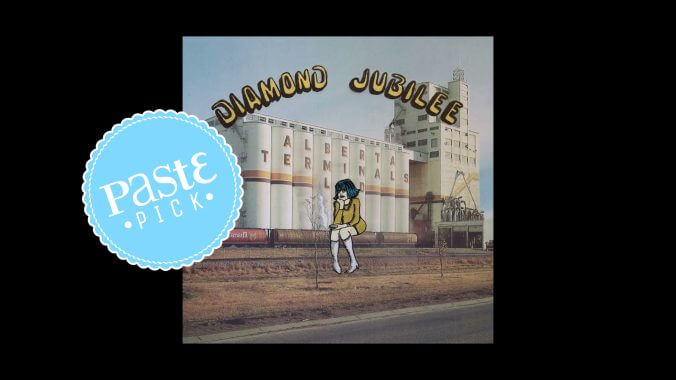Diamond Jubilee is Cindy Lee’s Bittersweet Magnum Opus
Patrick Flegel’s new double-album, available only on YouTube and GeoCities, sounds like it’s coming from the other room, if not another gauzy galaxy.

If there’s anything the grande dame divas of yore who initially inspired Durham-via-Toronto musician Patrick Flegel would have appreciated about their lo-fi, “confrontation pop” drag performance project Cindy Lee—specifically its seventh full-length project under the moniker, Diamond Jubilee—it’s their urge to sprawl, to take up time and space. Despite the fact that Flegel has unloaded an embarrassment of riches in the 32-track double album, the divas would appreciate the remove with which they do it as well. Mystery is a luxury in the social media age, as many people hip to the album’s release pointed out when they learned the record would only be available on YouTube or for purchase through early-internet server GeoCities, shutting the streamers out completely.
I point all of this out to say, given the current state of music production and consumption, it’s a miracle Diamond Jubilee has even reached as many ears as it has—and it’s mainly due to the enthusiasm of a small-but-loyal fanbase who have done the work picking up whatever breadcrumbs Flegel has dutifully left behind over the years. These are the people who knew that working title Diamond Jubilee was first mentioned in an early 2020 interview, and that in Flegel’s most recent interview, they noted, “I just wanna purge a bunch of this stuff that I’ve got, which is a lot of material…That’d be the dream, [to] do a double-record.” Those who have stood at attention to alert the rest of us have made Diamond Jubilee indie music’s most closely guarded hidden gem overnight.
The Cindy Lee backstory, for reasons I’ve outlined above, can be difficult to untangle for those of us who have only enjoyed a few songs in passing or others who have never encountered the work at all. Following the early-2010s split of Jagjaguwar-signed band Women, of which Flegel was a member and had set apart with their inventive guitar chops, there have been six Cindy Lee albums—but in terms of availability, these are not all created equal. For example, their 2020 album What’s Tonight to Eternity received a pretty major press push and a slew of rave reviews, only for Flegel to turn around and release their follow-up full-length, Cat Nine O’ Tails, as a limited independent release a few months later (it’s still not readily available anywhere).
In a music landscape where writers like me usually receive (extremely helpful) press kits outlining the contours of an artist’s months-long album rollout, there was something thrilling about resorting to the Cindy Lee subreddit (a great resource, 285 members strong) and having to dig through a million clips of Flegel performing as Cindy Lee in years past, lovingly compiled by those willing to unearth what Flegel buries for them. There’s an element of discovery that I remember from first researching artists I love when I was much younger—and the rush of the payoff when the thing you’re digging for turns out to be something like Diamond Jubilee.
If this is the final project to be released under the Cindy Lee name, as Flegel has hinted it might be (“THIS WILL BE CINDY’S LAST AMERICAN TOUR,” the neon writing above tour dates on GeoCities reads. “A KLASSIK POWER VANITY TRIP SITUATION. SHE WILL BE RUNNING IT HOT AND KEEPING IT L-I-T-E.”), Diamond Jubilee has all the hallmarks of a fitting swan song. It is easily the densest, most rewarding body of work they have released to date—a staggering collection of psychedelic pop songs that can be difficult to tackle head on, if only due to the sheer quantity and quality of the work. It’s the type of double-album that you’re forced to pause after a digital “side” finishes, simply because of how little Falgel—who recorded almost all of the parts on the album, with some help only from Steven Lind of fellow Canadian band and past Cindy Lee collaborators Freak Heat Waves—lets their foot off the gas. To a certain extent, the worthiness of a double-album can be determined by the number of cuts you could imagine making if you were assigned a co-producer gig, and I have yet to listen to Diamond Jubilee with the sense that I needed scissors at the ready. Its grandiosity is its charm, feeling like an expansive, cohesive soundscape to be enveloped by rather than a chore to sit through. To call it an “opus” does not feel like a stretch.
If a project like What’s Tonight to Eternity had a knack for blending aggressive noise-rock sounds and production moves with blissful melodicism of the classic pop era, all inspired by the complicated life and legacy of Karen Carpenter, Diamond Jubilee makes very few attempts to so fully immerse itself in the shadows. If the searing, abrupt blasts of guitar on past releases acted as a warning—a reminder to not lose yourself in the nostalgic glow of each song’s wistful core—here they feel exuberant in their urge to interrupt. A lilting, Supremes-like intro will be confronted by bright, aggressive stabs of shredding, but it’s celebratory—the sound of fireworks shooting off the parade float, complementary to whatever it’s playing up against.
-

-

-

-

-

-

-

-

-

-

-

-

-

-

-

-

-

-

-

-

-

-

-

-

-

-

-

-

-

-

-

-

-

-

-

-

-

-

-

-








































